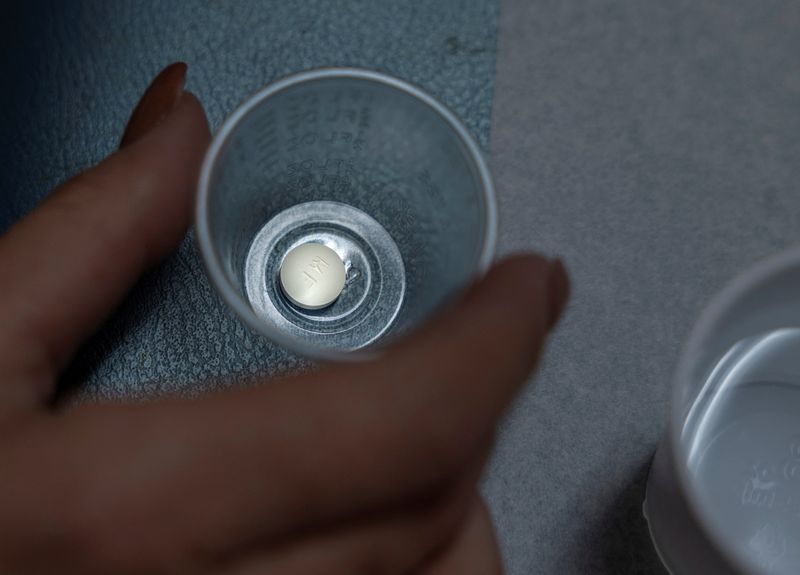By Brendan Pierson
(Reuters) - The U.S. Supreme Court on Friday blocked, for now, lower court orders that would have imposed new restrictions on the abortion pill mifepristone while a lawsuit by anti-abortion groups and doctors seeking to ban it proceeds.
But the legal fight over the drug is far from over. Here is what you need to know about the case as it further unfolds:
WHAT IS MEDICATION ABORTION?
Medication abortion is a two-drug regimen consisting of mifepristone followed by misoprostol used to terminate a pregnancy within the first 10 weeks. It accounts for more than half of U.S. abortions.
Two companies sell mifepristone for medication abortion in the United States: Danco Laboratories, which sells the brand-name version Mifeprex, and GenBioPro Inc, which sells a generic version.
WHAT IS THE LEGAL DISPUTE ABOUT?
Anti-abortion medical associations led by the Texas-based Alliance for Hippocratic Medicine sued the U.S. Food and Drug Administration last year in federal court in Amarillo, Texas, claiming the agency approved mifepristone for abortion in 2000 using an unlawful process and did not adequately consider the drug's safety. They asked U.S. District Judge Matthew Kacsmaryk, who is presiding over the lawsuit, to revoke the drug's approval, effectively pulling it off the market.
The FDA, along with mainstream U.S. medical associations, strongly disputes the claims. Danco intervened in the case to defend its drug.
HOW DID THE CASE GET TO THE SUPREME COURT?
Kacsmaryk on April 7 issued a temporary order, known as a preliminary injunction, suspending the drug's approval while the lawsuit proceeds. The injunction was not a final ruling, but Kacsmaryk found that the anti-abortion plaintiffs were likely to win on the merits.
The Biden administration and Danco appealed the injunction to the New Orleans-based 5th U.S. Circuit Court of Appeals, and asked for an emergency stay order blocking it from taking effect until the appeal is heard and decided.
The 5th Circuit last week granted a limited stay, allowing the pill to stay on the market but with significant restrictions, including a requirement that it be dispensed by a doctor in person and a limit on its use to the first seven weeks of pregnancy, down from 10. The ruling also withdrew approval for the generic sold by GenBioPro.
The Biden administration and Danco immediately asked the Supreme Court to overrule the 5th Circuit and impose an emergency stay.
WHAT DID THE SUPREME COURT DO?
The Supreme Court granted the request and put all of Kacsmaryk's injunction on hold until after the 5th Circuit decides the Biden administration's and Danco's appeal, and the Supreme Court itself considers any appeal from the 5th Circuit's decision.
That means that both brand-name and generic mifepristone will remain available with no new restrictions until those appeals play out, which could take months or even longer.
The Supreme Court did not rule on the merits of the case, meaning that mifepristone could still be restricted or banned at a later stage in the case.
WHAT ABOUT THE RULING FROM WASHINGTON STATE?
Minutes after Kacsmaryk's order on April 7, U.S. District Judge Thomas Rice in Spokane, Washington, issued a preliminary injunction barring the FDA from placing any new restrictions on mifepristone. That ruling applies only in 17 Democratic-led states and the District of Columbia, which had argued the government should loosen special safety restrictions around the pill.
The injunction was not at issue before the Supreme Court, and remains in effect. It would be in direct conflict with any future ruling restricting mifepristone, which would likely need to be resolved in another round of appeal.
ARE THERE ANY OTHER LAWSUITS OVER MIFEPRISTONE'S APPROVAL?
Yes. GenBioPro on Wednesday sued the FDA in federal court in Baltimore, seeking an order barring the agency from pulling the drug off the market without going through a formal process that gives the company a chance to be heard.
GenBioPro argues that the FDA cannot simply suspend approval without such a process, "regardless of external attempts to interfere." If successful, the lawsuit would set up another potential conflict with any future order restricting mifepristone.
WHAT HAPPENS NEXT?
A three-judge panel of the 5th Circuit will hear arguments in the appeal on May 17 and decide whether to uphold some or all of Kacsmaryk's injunction, potentially banning or restricting mifepristone again.
After that court rules, the losing side could petition for rehearing from all judges of the 5th Circuit, known as en banc rehearing, and also petition the Supreme Court a second time.
WHEN WILL THE CASE BE FINALLY DECIDED?
Once all appeals over the preliminary injunction are over, the case can proceed to trial on the merits before Kacsmaryk, giving both sides a chance to present evidence. That could include evidence about the process the FDA used leading to mifepristone's approval and about the drug's safety record.

Kacsmaryk could then decide the case without trial, known as summary judgment, or hold a trial including witness testimony.
A final judgment from Kacsmaryk could be months or even years away. Once it does come, the losing side will again have the chance to appeal to the 5th Circuit and, eventually, the Supreme Court.